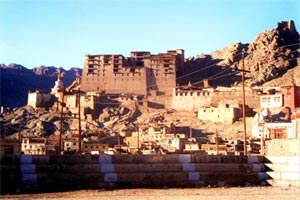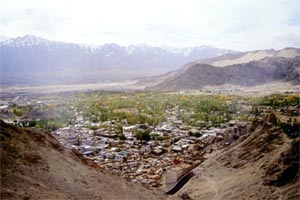|
Leh
– Landlocked, Peerless, Peculiar
 We
used the kitchen next morning to prepare our breakfast as
the party was over last night. The caretaker apologized for
the inconvenience and we nodded for ‘not required’.
Soon, we were on our way to the capital city of Ladakh, Leh!
The Indus valley, particularly from Khaltse to Upshi (50 kms
beyond Leh) is the historical and cultural heartland of Ladakh
and has many interesting sites enroute. The first site that
we checked out was the ruins of an ancient Palace/fort at
Basgo. In spite of its crumbling state the remains of an erstwhile
palace did not fail to entice us. Also, it was here that we
saw one of the biggest chortens of the region. We
used the kitchen next morning to prepare our breakfast as
the party was over last night. The caretaker apologized for
the inconvenience and we nodded for ‘not required’.
Soon, we were on our way to the capital city of Ladakh, Leh!
The Indus valley, particularly from Khaltse to Upshi (50 kms
beyond Leh) is the historical and cultural heartland of Ladakh
and has many interesting sites enroute. The first site that
we checked out was the ruins of an ancient Palace/fort at
Basgo. In spite of its crumbling state the remains of an erstwhile
palace did not fail to entice us. Also, it was here that we
saw one of the biggest chortens of the region.
Then we progressed towards ‘Nimmu’, a very small
town, famous for the confluence of Zanskar and Indus. Beyond
Nimmu, the road crawls along the Indus a little further, after
which it veers off into a vast plateau. We took a brief halt
to check out the famous Magnetic Hill. Bullet did not appear
to move, of course, but after few customary photo-shots when
I kickstarted it, compression seemed to be very less and bike
roared in first gear for want of more power to lug us beyond.
Situation eased off though after riding for about four kilometers.
Tracing back the Indus, the road descended into a vast intensely
cultivated  valley
but crop season was already over and the region seemed to
be preparing for the harsh winters. Riding past the stacks
of fodder lying along the road and deliberately overlooking
the diversions for Phyang and subsequently the Spitok Gompa,
we entered the Leh ‘city’. To search a place for
stay was first on our agenda and therefore we zoomed into
the ‘Changspa’ area after checking a couple of
hotels which were already closed for the season due to scarcity
of tourists. In our present abode for the next week, we got
heavy off-season discount but the accommodation was fitting
to its tariff for the facts that it was non-AC (non-heated)
and had no geyser in the toilet. I would like to make a special
mention here about the prevailing power supply situation in
the Leh city. In our total stay, we enjoyed a lighted room
for just over five hours. Moral is - It is much better to
stay at an inexpensive place and ask to the host/caretaker
for the hot water when required. Otherwise, lookout for the
ones with a ‘working’ generator installed. valley
but crop season was already over and the region seemed to
be preparing for the harsh winters. Riding past the stacks
of fodder lying along the road and deliberately overlooking
the diversions for Phyang and subsequently the Spitok Gompa,
we entered the Leh ‘city’. To search a place for
stay was first on our agenda and therefore we zoomed into
the ‘Changspa’ area after checking a couple of
hotels which were already closed for the season due to scarcity
of tourists. In our present abode for the next week, we got
heavy off-season discount but the accommodation was fitting
to its tariff for the facts that it was non-AC (non-heated)
and had no geyser in the toilet. I would like to make a special
mention here about the prevailing power supply situation in
the Leh city. In our total stay, we enjoyed a lighted room
for just over five hours. Moral is - It is much better to
stay at an inexpensive place and ask to the host/caretaker
for the hot water when required. Otherwise, lookout for the
ones with a ‘working’ generator installed.
Piling the luggage in the room, we immediately rode back
to DC office for obtaining permits. Then started the series
of ‘Julley ji’. I can’t remember how many
times I spoke it during the whole day. I love this word, meaning
“Hello”. We applied for permits on a proforma
and attached the photocopies of passport for identity purpose.
But the officer was out in the field so the clerk asked us
to stay and wait. We instead thought lunch would be a good
idea. DC office overlooks the only stadium of Leh and its
arena is used for all the festivals and sports activities.
 From
DC office gate, we had a nice front view of Leh Palace and
Tsemo Castle, both now in ruins. Renovation work at Leh Palace
has been started to reinstate its past glory. I hope it continues
to Tsemo castle too. Intense Sun belied the onset of harsh
winters of Ladakh. Every third countenance we encountered
was tanned. Finally, the clerk, seeing bleak chances of the
Officer turning up before the closure of the office, got the
permits done by the deputy. Getting the permits at around
5:00 pm, we rushed to the Juma mechanic patronized by 60kph
on ‘Fort Road’. He re-tuned the bike for high
altitude conditions. Then we headed straight into the main
market to call the 60kph group members and back home. After
making the calls which is a task in itself we loitered around
on the old streets of the town, enjoying our relaxing spell
for we had ventured into a unique territory on exactly eighth
day of our grueling ride. From
DC office gate, we had a nice front view of Leh Palace and
Tsemo Castle, both now in ruins. Renovation work at Leh Palace
has been started to reinstate its past glory. I hope it continues
to Tsemo castle too. Intense Sun belied the onset of harsh
winters of Ladakh. Every third countenance we encountered
was tanned. Finally, the clerk, seeing bleak chances of the
Officer turning up before the closure of the office, got the
permits done by the deputy. Getting the permits at around
5:00 pm, we rushed to the Juma mechanic patronized by 60kph
on ‘Fort Road’. He re-tuned the bike for high
altitude conditions. Then we headed straight into the main
market to call the 60kph group members and back home. After
making the calls which is a task in itself we loitered around
on the old streets of the town, enjoying our relaxing spell
for we had ventured into a unique territory on exactly eighth
day of our grueling ride.
One may get stranded in the mazy layout of the streets and
some of them have dead ends too but Tsemo castle acts as a
lighthouse and is visible from almost every corner of the
township. Notably, even in ‘offseason’ we could
spot more foreigners than the locals and, as a matter of fact,
with every passing year the number of foreign tourists visiting
Leh doubles up. Such is the attraction of this ‘Little
Lhasa’. Leh is an ‘international destination’
being as high a priority as ‘Benares’ for an India-bound
foreign traveler. It has a typical tourist appeal much of
which comes through the difference in terrain and culture
of inhabitants. Ladakh was closed to foreigners for many years,
and despite its access to foreigners since 1974, it still
remains landlocked for two-three months of the year due to
snow.
 Therefore,
the influence of other cultures is understandably less, and
the traditional ways of life, architecture and religious devotion
remain largely similar to the old times. But, as they say,
change is inevitable. This was obvious to us in more than
one ways, at least in Leh, if not in other parts. Leh’s
main bazaar caters mainly to foreigners who seem to be interested
in the handicrafts shop. These shops are mainly owned by Kashmiri
traders and the stuff on sale is also not ‘laddakhi’!
We checked out the famous bakery shops on the main street.
Apart from their occidental ambience they cater to different
tastes and their repertoire of products is quite handsome.
Overall, main bazaar street is a cool place to roam and we
enjoyed the company of few other swashbucklers looking at
their bikes and sharing the daring stories. Finally, we decided
to unwind in a Tibetan restaurant. ‘Chowmin’ was
a treat and so was ‘whatever’ Manish had. We reached
back our room at around 10:00 pm and slept almost immediately
as we were all set to leave for Pangong Tso Lake tomorrow
early morning. Therefore,
the influence of other cultures is understandably less, and
the traditional ways of life, architecture and religious devotion
remain largely similar to the old times. But, as they say,
change is inevitable. This was obvious to us in more than
one ways, at least in Leh, if not in other parts. Leh’s
main bazaar caters mainly to foreigners who seem to be interested
in the handicrafts shop. These shops are mainly owned by Kashmiri
traders and the stuff on sale is also not ‘laddakhi’!
We checked out the famous bakery shops on the main street.
Apart from their occidental ambience they cater to different
tastes and their repertoire of products is quite handsome.
Overall, main bazaar street is a cool place to roam and we
enjoyed the company of few other swashbucklers looking at
their bikes and sharing the daring stories. Finally, we decided
to unwind in a Tibetan restaurant. ‘Chowmin’ was
a treat and so was ‘whatever’ Manish had. We reached
back our room at around 10:00 pm and slept almost immediately
as we were all set to leave for Pangong Tso Lake tomorrow
early morning.
Top ^
|